#note: 4/5
Explore tagged Tumblr posts
Text
The dichotomy of Brennan helping with ability score rolls for newer players:
Titan Takedown: Preps high-level base stats for the cast, with everyone having a 20 in their two most relevant ability scores and no one really having a genuine dump stat (no one's character has below a 14/+2 modifier in any ability), which allows the players to play to their class strengths and not have to worry about fucking up as much in a shorter, tighter campaign.
Fantasy High: Ally Beardsley rolls a 4 for Kristen's Dex and has to live with with the consequences of that for 6+ years
#Dimension 20#D20#Fantasy High#Titan Takedown#Just thinking about how funny it is when you look at it from the broadest possible angle#I know it's easier to have prepared high-octane PCs to make it easy for people who've never played#But without that context Brennan seeing Ally roll a -3 modifer and being like 'oh this is going to be hilarious' kills me#Ally: 'I got a low number for my dexterity but that won't matter right?'#Brennan: >:)#Seta speaks#Side note I can't remember if they rolled a 5 and dropped it to a 4 or rolled a 4 outright so disclaimer that that number might be off#top posts#EDIT: Man I've been here for like 4 months and the D20 fandom already got a post of mine to 1k this is awesome lmao
4K notes
·
View notes
Text


Jason Schreier for Bloomberg reports: 'Inside the ‘Dragon Age’ Debacle That Gutted EA’s BioWare Studio'
The latest game in BioWare’s fantasy role-playing series went through ten years of development turmoil. The failure of Dragon Age: The Veilguard, released in October, led EA to gut BioWare
[note: article is below cut after these tweets]

Jason Schreier: "NEW: What went wrong with Dragon Age: The Veilguard? Why was the writing so tonally inconsistent? Why did it feel so shallow? Why were there so few choices? Really, after ten years of turbulence, it was a miracle that anything came out at all. This is the story [link]:" [source]

Jason Schreier: "The fatal flaw for Dragon Age: The Veilguard wasn't just that it pivoted from single-player to multiplayer and back again. It was that after the second pivot, the team was forced to keep going rather than hit the reset button and take the time to create a new plan." [source]

Jason Schreier re: this old tweet from Casey Hudson: "Fun fact: when I first reported at Kotaku in 2018 that Dragon Age 4 was rebooted to become a live-service game, BioWare studio head Casey Hudson wrote this on Twitter. But it was not entirely truthful. In reality, the game was being designed around cooperative multiplayer, replayable missions, etc" [source] Casey Hudson's old tweet from 2018: "Reading lots of feedback regarding Dragon Age, and I think you'll be relieved to see what the team is working on. Story & character focused. Too early to talk details, but when we talk about "live" it just means designing a game for continued storytelling after the main story."
Rest of post/article under cut due to length.
(bold in the text below is mine for emphasis)
"In early November, on the eve of the crucial holiday shopping season, staffers at the video-game studio BioWare were feeling optimistic. After an excruciating development cycle, they had finally released their latest game, Dragon Age: The Veilguard, and the early reception was largely positive. The role-playing game was topping sales charts on Steam, and solid, if not spectacular, reviews were rolling in. But in the weeks that followed, the early buzz cooled as players delved deeper into the fantasy world, and some BioWare employees grew anxious. For months, everyone at the subsidiary of the video-game publisher Electronic Arts Inc. had been under intense pressure. The studio’s previous two games, Mass Effect: Andromeda and Anthem, had flopped, and there were rumors that if Dragon Age underperformed, BioWare might become another of EA’s many casualties. Not long after Christmas, the bad news surfaced. EA announced in January that the new Dragon Age had only reached 1.5 million players, missing the company’s expectations by 50%. The holiday performance of another recently released title, EA Sports FC 2025, was also subpar, compounding the problem."
"As a result of the struggling titles, EA Chief Executive Officer Andrew Wilson explained, the company would be significantly lowering its sales forecast for the fiscal year ahead. EA’s share price promptly plunged 18%. “Dragon Age had a high-quality launch and was well-reviewed by critics and those who played,” Wilson later said on an earnings call. “However, it did not resonate with a broad enough audience in this highly competitive market.” Days after the sales revision, EA laid off a chunk of BioWare’s staff at the studio’s headquarters in Edmonton, Canada, and permanently transferred many of the remaining workers to other divisions. For the storied, 30-year-old game maker, it was a stunning fall that left many fans wondering how things had gone so haywire — and what might come next for the stricken studio. According to interviews with nearly two dozen people who worked on Dragon Age: The Veilguard, there were several reasons behind its failure, including marketing misfires, poor word of mouth and a 10-year gap since the previous title. Above all, sources point to the rebooting of the product from a single-player game to a multiplayer one — and then back again — a switcheroo that muddled development and inflated the title’s budget, they say, ultimately setting the stage for EA’s potentially unrealistic sales expectations. A spokesperson for EA declined to comment."
"The union between BioWare and EA started off with lofty aspirations. In 2007, EA executives announced they were acquiring BioWare and another gaming studio in a deal worth $860 million. The goal was to diversify their slate of games, which was heavy in sports titles, like Madden NFL, and light in the kind of adventure and role-playing games that BioWare was known for. Initially, it looked like a smart move thanks to a string of big hits. In 2014, BioWare released Dragon Age: Inquisition, the third installment in a popular action series dropping players in a semi-open world full of magic, elves and fire-spewing dragons. The fantasy title went on to win the much-coveted Game of the Year Award and sell 12 million copies, according to its executive producer Mark Darrah — a major validation of EA’s diversification strategy. Before long, Darrah and Mike Laidlaw, the creative director, began kicking around ideas for the next Dragon Age installment — code name: Joplin — aiming for a game that would be smaller in scope. But before much could get done, BioWare shifted the studio’s focus to more pressing titles coming down the pike. In 2017, BioWare released Mass Effect: Andromeda, the fourth installment in a big-budget action series set in space. Unlike its critically successful predecessors, the game received mediocre reviews and was widely mocked by fans. A few months after the disappointing release, the head of BioWare stepped down and was soon replaced by Microsoft Inc.’s Casey Hudson, an alumni of BioWare’s early, formative years."
"Like much of the industry, EA executives were growing increasingly enamored of so-called live-service games, such as Destiny and Overwatch, in which players continue to engage with and spend money on a title for months or even years after its initial release. With EA aiming to make a splash in the fast-growing category, BioWare poured resources into Anthem, a live-service shooter game that checked all the right boxes. One day in October 2017, Laidlaw summoned his colleagues into a conference room and pulled out a few pricey bottles of whisky. The next Dragon Age sequel, he told the room, would also be pivoting to an online, live-service game — a decision from above that he disagreed with. He was resigning from the studio. The assembled staff stayed late through the night, drinking and reminiscing about the franchise they loved. “I wish that pivot had never occurred,” Darrah would later recount on YouTube. “EA said, ‘Make this a live service.’ We said, ‘We don’t know how to do that. We should basically start the project over.’” Former art director Matt Goldman replaced Laidlaw as creative director, and with a tiny team began pushing ahead on a new multiplayer version of Dragon Age — code name: Morrison — while everyone else helped to finish Anthem, which was struggling to coalesce. Goldman pushed for a “pulpy,” more lighthearted tone than previous entries, which suited an online game but was a drastic departure from the dark, dynamic stories that fans loved in the fantasy series."
"In February 2019, BioWare released Anthem. Reviews were scathing, calling the game tedious and convoluted. Fans were similarly displeased. On social media, players demanded to know why a studio renowned for beloved stories and characters had made an online shooter with a scattershot narrative. In the wake of BioWare’s second consecutive flop, the multiplayer version of Dragon Age continued to take shape. While the previous games in the franchise had featured tactical combat, this one would be all action. Instead of quests that players would only experience once, it would be full of missions that could be replayed repeatedly with friends and strangers. Important characters couldn’t die because they had to persist for multiple players across never-ending gameplay. As the game evolved over the next two years, the failure of Anthem hovered over the studio. Were they making the same mistakes? Some BioWare employees scoffed that they were simply building “Anthem with dragons.” Throughout 2020, the pandemic disrupted the game’s already fraught development. In December, Hudson, the head of the studio, and Darrah, the head of the franchise, resigned. Shortly thereafter, Gary McKay, BioWare’s new studio head, revealed yet another shift in strategy. Moving forward, the next Dragon Age would no longer be multiplayer."
"“We were thinking, ‘Does this make sense, does this play into our strengths, or is this going to be another challenge we have to face?’” McKay later told Bloomberg News. “No, we need to get back to what we’re really great at.” In theory, the reversion back to Dragon Age’s tried-and-true, single-player format should have been welcome news inside BioWare. But there was a catch. Typically, this kind of pivot would be coupled with a reset and a period of pre-production allowing the designers to formulate a new vision for the game. Instead, the team was asked to change the game’s fundamental structure and recast the entire story on the fly, according to people familiar with the new marching orders. They were given a year and a half to finish and told to aim for as wide a market as possible. This strict deadline became a recurring problem. The development team would make decisions believing that they had less than a year to release the game, which severely limited the stories they could tell and the world they could build. Then the title would inevitably be delayed a few months, at which point they’d be stuck with those old decisions with no chance to stop and reevaluate what was working. At the end of 2022, amid continually dizzying leadership changes, the studio started distributing an “alpha” build of Dragon Age to get feedback internally and from outside playtesters. According to people familiar with the process, the reactions were concerning. The game’s biggest problem, early players agreed, was a lack of satisfying choices and consequences. Previous BioWare titles had presented players with gut-wrenching decisions. Which allies to save? Which factions to spare? Which enemies to slay? Such dilemmas made fans feel like they were shaping the narrative — historically, a big draw for many BioWare games."
"But Dragon Age’s multiplayer roots limited such choices, according to people familiar with the development. BioWare delayed the game’s release again while the team shoehorned in a few major decisions, such as which of two cities to save from a dragon attack. But because most of the parameters were already well established, the designers struggled to pair the newly retrofitted choices for players with meaningful consequences downstream. In 2023, to help finish Dragon Age, BioWare brought in a second, internal team, which was working on the next Mass Effect game. For decades there’d been tension between the two well-established camps, known for their starkly divergent ways of doing things. BioWare developers like to joke that the Dragon Age crew was like a pirate ship, meandering and sometimes traveling off course but eventually reaching the port. In contrast, the Mass Effect group was called the USS Enterprise, after the Star Trek ship, because commands were issued straight down from the top and executed zealously. As the Mass Effect directors took control, they scoffed that the Dragon Age squad had been doing a shoddy job and began excluding their leaders from pivotal meetings, according to people familiar with the internal friction. Over time, the Mass Effect team went on to overhaul parts of the game and design a number of additional scenes, including a rich, emotional finale that players loved. But even changes that appeared to improve the game stoked the simmering rancor inside BioWare, infuriating Dragon Age leaders who had been told they didn’t have the budget for such big, ambitious swings."
"“It always seemed that, when the Mass Effect team made its demands in meetings with EA regarding the resources it needed, it got its way,” said David Gaider, a former lead writer on the Dragon Age franchise who left before development of the new game started. “But Dragon Age always had to fight against headwinds.” Early testers and Mass Effect leads complained about the game’s snarky tone — a style of video-game storytelling, once ascendant, that was quickly falling out of fashion in pop culture but had been part of Goldman’s vision for the multiplayer game. Worried that Dragon Age could face the same outcome as Forspoken — a recent title that had been hammered over its impertinent banter — BioWare leaders ordered a belated rewrite of the game’s dialogue to make it sound more serious. (In the end, the resulting tonal inconsistencies would only add to the game’s poor reception with fans.) A mass layoff at BioWare and a mandate to work overtime depleted morale while a voice actors strike limited the writers’ ability to revise the dialogue and create new scenes. An initial trailer made the next Dragon Age seem more like Fortnite than a dark fantasy role-playing game, triggering concerns that EA didn’t know how to market the game. When Dragon Age: The Veilguard finally premiered on Halloween 2024 after many internal delays, some staff members thought there was a lot to like, including the game’s new combat system. But players were less impressed, and sales sputtered."
"“The reactions of the fan base are mixed, to put it gently,” said Caitie, a popular Dragon Age YouTuber. “Some, like myself, adore it for various reasons. Others feel utterly betrayed by certain design choices.” Following the layoffs and staff reassignments at BioWare earlier in the year, a small team of a few dozen employees is now working on the next Mass Effect. After three high-profile failures in a row, questions linger about EA’s commitment to the studio. In May, the company relabeled its Edmonton headquarters from a BioWare office to a hub for all EA staff in the area. Historically, BioWare has never been the most important studio at EA, which generates more than $7 billion in annual revenue largely from its sports games and shooters. Depending on the timing of its launches, BioWare typically accounts for just 5% of EA’s annual bookings, according to estimates by Colin Sebastian, an analyst with Robert W. Baird & Co. Even so, there may be strategic reasons for EA to keep supporting BioWare. Single-player role-playing games are expensive to make but can lead to huge windfalls when successful, as demonstrated by recent hits like Cyberpunk 2077, Elden Ring and Baldur’s Gate 3. In order to grow, EA needs more than just sports franchises, said TD Cowen analyst Doug Creutz. Trying to fix its fantasy-focused studio may be easier than starting something new. “That said, if they shuttered the doors tomorrow I wouldn’t be totally surprised,” Creutz added. “It has been over a decade since they produced a hit.”"
Article by Jason Schreier. [source]
#dragon age: the veilguard#dragon age the veilguard spoilers#dragon age: dreadwolf#dragon age 4#the dread wolf rises#da4#dragon age#mass effect#mass effect 5#bioware#mass effect: andromeda#anthem#video games#long post#longpost#covid mention#alcohol cw#feels#1k+#note: this post has been updated
2K notes
·
View notes
Text
My irl buddies were making silly meme mugs at ceramics masterclass today and thought it was funny of me to just paint cactuses on mine, like, you know, a normal person. They think I'm sane. They have no idea I made myself a cactus ring mug.
#notes&thoughts#it will be fired in 4-5 weeks and i CAN'T WAIT to pick it up#it looks silly but the clay itself should be very pretty pale yellow color with dark spots when fired#trafficblr
3K notes
·
View notes
Text

archivist be upon ye
#relistening to tma again#i think the last time i’ve drawn anything related to it was like may 2020#god it’s been a while#have been listening to the magnus protocol and my god it’s so good#but heres good old jonathan as a treat#the interest has been in deep slumber for the past 4/5 years only periodically coming back to life#i’m very normal about this podcast actually#on other note i also started a taz balance relisten#what’s up with me and revisiting my middle school fixations lately#anyways#if you’re still reading these tags i’m impressed i could never with my abysmal attention span#tma#the magnus archives#the magnus pod#jonathan sims#the archivist#tma jon#fanart#my art#digital art#illustration#doodle
10K notes
·
View notes
Text

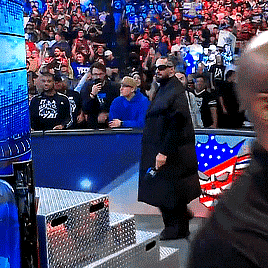


Seth's SHIELD-core fashion
+bonus

#been looking for an excuse to make this for months and i finally got a new example :)#*seth wears something black* me: is that a shield reference???#seth rollins#sethrollinsedit#the shield#wwe#wweedit#wwe gifs#wrestlingedit#mine#also important note that all of these relate to roman:#1. royal rumble full shield entrance before match with roman#2. road to mania XL. he entered through the crowd a couple of times during roman/rock/cody promos#3. not roman related but if i remember correctly it was on the road to survivor series so it feels like it was a tease for this story#4 and 5. i think it's pretty self explanatory lol
513 notes
·
View notes
Note
Do you know who Yuu is canonically close to? Like who actually considers themselves to be friends or at least close with Yuu and willingly interacts with them. I'm sorry if this sounds rude because I know people have their own yuusonas and headcannons but I'm just curious.

In order to respond to this question, I will primarily be referring to the main story. Voice lines are not going to be considered because a lot of them are primarily aimed at the player and serve as fanservice, which does not accurately reflect the character's relationship with them in the main story canon. Events and vignettes do indicate character relationships, but are not technically "canon" to the main story. However, I will bring up examples from these, as while these may not fit in a coherent main story timeline, the lore presented in them is still very sound. Yuu appears to be canonically close with the first years, although their closest allies among this group are Ace, Deuce, and Grim. The first years are seen partying at the end of Terror is Trending as a group, clean up the ghost wedding decorations together, stake out Mickey Mouse + hang out at Lilia's farewell party in book 7 together, band together to help Ortho determine a club to join in his College Gear vignette, and help Ortho research the concept of "evolution" for Fairy Gala: If. Yuu is obviously very close with Ace and Deuce, seeing as they share the same homeroom, eat lunch together, and have gone through many dangerous situations with one another (several OB battles being the main one). They think of each other when one of them isn't included, either! For example, in White Rabbit Fest, Deuce invited Ace to join them (but Ace couldn't due to basketball practice). So Deuce decides to buy him a souvenir instead! Ace extends an invitation to Deuce to join him for Playful Land. And do I even need to bring up the end of book 4 where those two bozos take a long and convoluted trip from the Queendom of Roses to Sage's Island DURING WINTER BREAK to check up on Yuu after receiving a SOS text from them??? Or their tearful reunion at the end of book 6??
Grim is also a very important friendship for Yuu. They are, of course, the first person Yuu meets upon their arrival in Twisted Wonderland, as well as one of their roommates. He's almost always with them, for better or for worse. Yuu is shown to be hurt when Grim attacks them at the end of book 5 and worries for his wellbeing. In fact, the very first time Yuu blatantly acts against Crowley's orders (to stay put) is to rescue Grim in book 6 after he was captured by Ferrymen.
I'd also like to add that the Ramshackle Ghosts are also pretty close with Yuu! They not only live together, but also cover for Yuu when they're unable to fulfill the chores Crowley asked them to do over winter break, play magift/spelldrive with Yuu, worry when Yuu goes away for extended periods of time, and make a Halloween costume for Yuu.
Some honorable/"up for debate" mentions go out to:
Crowley - Some fan works like to portray Crowley (or other staff) as a father figure to Yuu. However, Crowley does the bare minimum in canon to act like a parent and is often offloading work onto Yuu. He doesn't really show affection or go out of his way to spend time with them unless he wants something from Yuu.
"The nice guys" (Rook, Kalim, Silver, etc.) - They're nice to everyone, but not particularly close with Yuu specifically; it should be noted that Kalim, Lilia, and Silver all have called Yuu their "friend" in dialogue. Trey and Riddle - I think it could be said that Yuu is closer to Heartslabyul than the other dorms (partly because two of their closest friends are from this dorm), but I don't know if they're actually "friends"? Yes, Yuu does walk around with Riddle and Trey in book 5 to check out the culture fair. Yes, Trey did send sweets over with Adeuce at the start of their training camp. But I never actually see Riddle and Trey going out of their way to casually hang out with Yuu or anything like that. They seem very... "business professional" with Yuu to me?? But I can see why others may see Yuu being close with the whole dorm. Malleus - I might catch some heat for saying this, but I don't believe Malleus and Yuu are as close as people think they are or want them to be. Do they talk consistently throughout the main story? Sure, but the exchanges are kind of short and usually don't amount to them sharing a lot. Does Malleus help Yuu out? Absolutely, especially in books 3 and 5. It doesn't mean they're necessarily close; every character gets moments where they pitch in. The nickname thing serves as a necessary filler because Malleus refuses to give his real name; it arguably is not a sign of intimacy (especially given that Grim came up with the name, not Yuu). I can see a point being made in Malleus sending a holiday card for Yuu in book 4 and Yuu returning the gesture with a VDC/SDC pass in book 5 (though this could also be viewed as transactional or tit for tat). Think about the main story timeline to put this all into perspective. It's been roughly 6 months since the start of the school year and Malleus and Yuu have only really had brief direct interactions like MAYBE 4 or 5 times total. Yuu doesn’t go over to speak with Malleus upon their return from S.T.Y.X. HQ in book 6; they’re focused solely on their reunion with Adeuce and Grim. They don't have other means of communication (like each others' phone numbers, which Adeuce do have, as seen in book 4) and they don't ever hang out outside of these mandated interactions. Yuu doesn't learn their name properly until book 5, which is in FEBRUARY. And, unlike Yuu's friendships with Adeuce and Grim, Malleus's friendship relies a lot on self-projection. Whereas it's clear that the friendship between Yuu and the idiot trio is mutual, it feels very one-sided with Malleus. Like, Malleus seems more invested in it than Yuu is. He's the one thinking of them on holiday break; Yuu doesn’t think of him on holiday break. They think of Malleus only in like early book 7 when Ortho asks if they know any fae, and it’s for a personal reason too (helping them find a way home).
Yuu's closeness with Malleus is left vaguely defined so the player can insert whatever their own feelings about him are into the scenario. They speak with him in a casual tone, yet they never go out of their way to actually invite him to functions or ask questions to learn more about him. Yuu doesn’t even seem to be that torn up about going back home and never seeing Malleus again. This is not the case with Adeuce and Grim; Yuu has dialogue options which imply they would miss their company. Yuu feels so… detached from Malleus; he at best feels like an amicable (?) acquaintance, but not a friend.
#disney twisted wonderland#twst#disney twst#twisted wonderland#Malleus Draconia#Ace Trappola#Deuce Spade#Yuu#Grim#Riddle Rosehearts#Trey Clover#Silver#Rook Hunt#Kalim Al-Asim#Jack Howl#Sebek Zigvolt#Epel Felmier#Ortho Shroud#notes from the writing raven#question#book 7 spoilers#Ortho college gear vignette spoilers#fairy gala if spoilers#terror is trending spoilers#white rabbit fest spoilers#stage in playful land spoilers#book 4 spoilers#book 3 spoilers#book 5 spoilers#book 6 spoilers
488 notes
·
View notes
Text






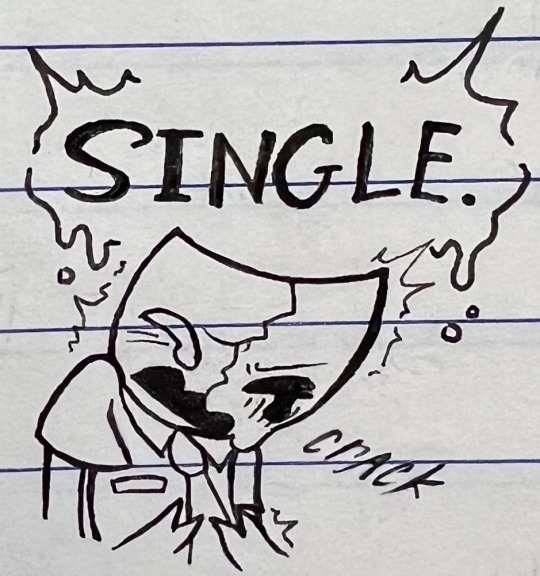


uhm guys I think she’s losing it
#Idk how and why but this is 3 days of work😭#Everytime i think im done i kept adding more drawings#Nooo bbg dont be sad:(#*hypocrite*#For reference it was only planned to be 5 mini sketches#Now its like…*counting* 12#Everyones got their own bag of issues ig#Shes got problems alright#Her new mask is growing on me a lil’ bit#Bell u ARE right she does look good w/ pupils#tadc gangle#spudsys#the amazing digital circus#tadc art#Tadc fanart#tadc comic#tadc angst#Allll the tagsss#Yo this post just passed like#500 notes in 4 days#Goddang
911 notes
·
View notes
Text
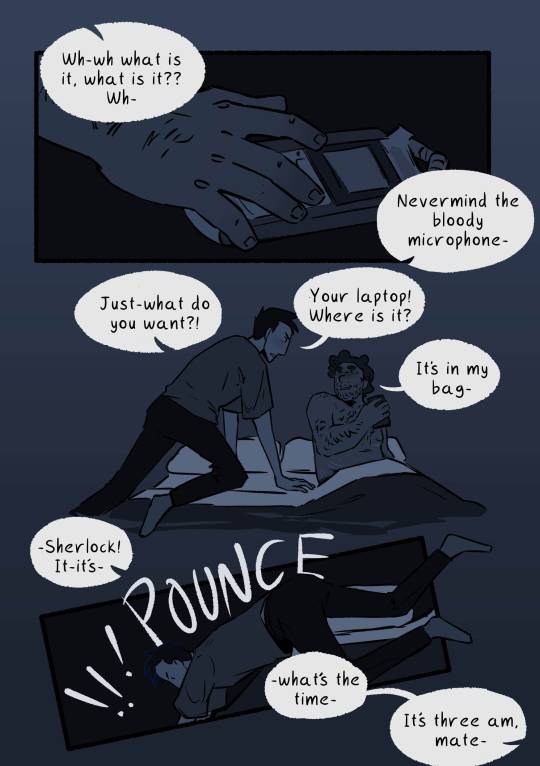
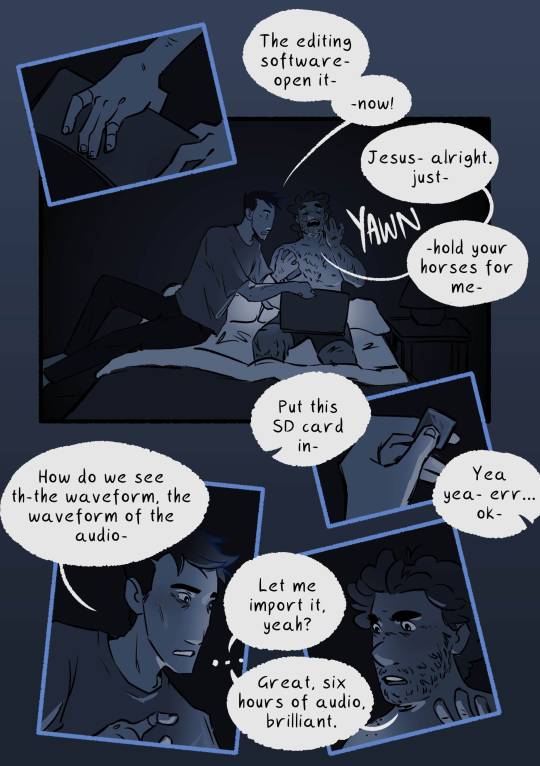
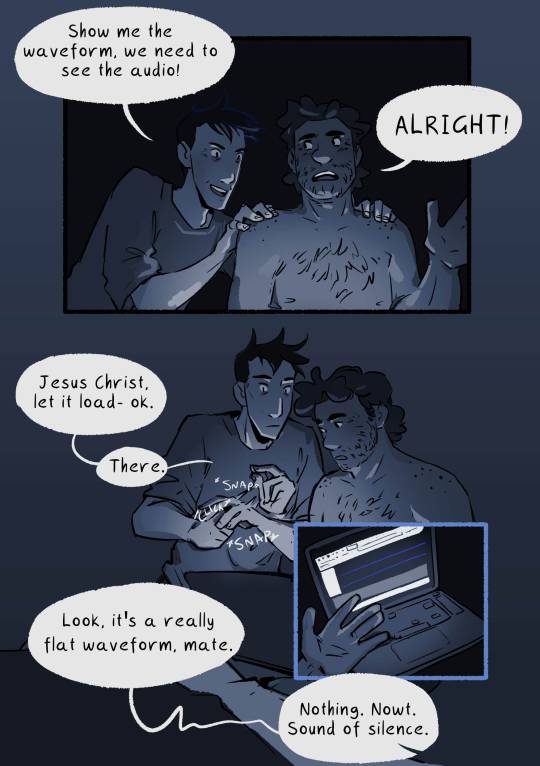
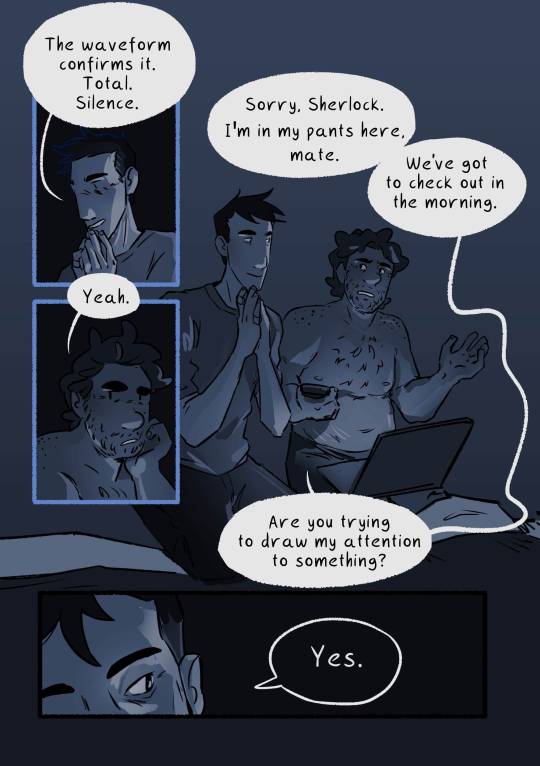
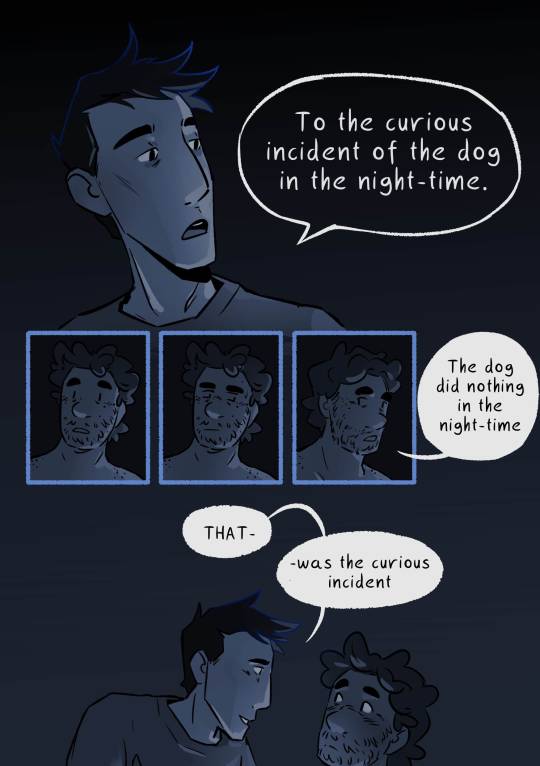
SILVER BLAZE PART THREE - happy jonkday everyone. one of these days i'll draw a scene that doesn't take place at night
#sherlock & co#sherlock and co#love when they quote acd holmes#a couple notes: i think i probably made sherlock more excitable than he actually is in this scene#its my opinion that he smiles more than we're giving him credit for but mostly i just needed to make the comic dynamic#and the thought of sherlock excitedly shaking watson was rly funny so. i did that. creative freedom#2. love that u can hear him stimming here i love him so muchhhh#3. the implication that sherlock sat and watched 6 hours. SIX HOURS of totally silent footage#and thought to himself 'hm...that was a bit quiet. TOO quiet...better wake my podcaster'#SENDS me#4. what on earth happens after this scene. does he just leave without elaborating.#anyway theyre fun to draw so thats overriding my sense that im being really annoying rn#im sooo sorry ;0;#5. yeah john has it all. freckles. stretch makes. body hair. scars. mwah#patsart
2K notes
·
View notes
Note
are archen and rufflet besties

What a delightful ask! I do believe that they are!!!
#just a couple of gen 5 birds having a lovely time :) on that note while not included here i do think pidove is their friend too#also sorry for how messy this is :( the drivers for my tablet have been inoperable for days so i had to do this with 0 pen pressure and-#-no pen stability :( i have been very upset abt this but this ask was a big mood booster :>#despite the horrors (drawong tablet being funky) i persisted in the name of adorable birds#oh also#this was my first time drawing rufflet since i was a child! id like to think that lil baby me wld be proud at how much better weve gotten :)#haha oops its 4 am lemme schedule this for a normal time fhshfhshfh#archen#rufflet#pokemon#pkmn#pokemon art#my art
291 notes
·
View notes
Text


























#starbee#transformers idw#idw transformers#im not tagging every version of transformers here bc ik only the idw readers (me) are freaks about this ship#she toxic on my yaoi until i starbee#web weaving#izzyz centoz#izzyz webz#tf bumblebee#tf starscream#this is how I PERSONALLY view starbee#i honestly doubt that there are 4 people who agree with me#posts that will get 5 notes#starscream x bumblebee#TOXIC YAOI... TOXIC YAOI.. LEAVE ME BE TOXIC YAOI#it is 3 am bru#I HAVE SO MANY STARBEE FEELINGS ACTUALLY#starscreams self hatred vs bumblebees unending love#bumblebees self deprecation vs starscreams ego#i DO think starscream and bumblebee love eo BUT i dont think either of them would ever be privy to admit it#planning out a 200k fwb hurt/ little comfort starbee au rn
222 notes
·
View notes
Text
EuroGamer: 'BioWare knew the deepest secrets of Dragon Age lore 20 years ago, and locked it away in an uber-plot doc'
Original creator David Gaider on how "some of the big mysteries are being solved".
Rest of post under a cut due to length and possible spoilers.
"As I write about the secrets hidden in Dragon Age's mysterious Fade, and as I uncover some of them playing Dragon Age: The Veilguard, one question keeps rising up in my mind. How much did BioWare know about future events when first developing the series more than 20 years ago? That's a long time, and back then BioWare didn't know there would be a second game, which is why Dragon Age: Origins has an elaborate and far-reaching epilogue. Why lay so much lore-track ahead of yourself if you don't think you'll ever get there? But look more closely at Origins and there are big clues suggesting BioWare did know about future Dragon Age events. There are obvious signs in the original game, such as establishing recurring themes like Old Gods and the Blight and Archdemons. But there's also Flemeth, Morrigan's witchy mother, who's intimately linked to events in the series now - more specifically: intimately linked to Solas. Does her existence mean Solas was known about back then too? There's only one person I can think of to answer this and it's David Gaider, the original creator of Dragon Age's world and lore. We've talked before, once in a podcast and once for a piece on the magic of fantasy maps, where we discussed the creation of Dragon Age's world. And much to my surprise, when I ask him what he and the BioWare team knew back then, he says they knew it all. "By the time we released Dragon Age: Origins, we were basically sure that it was one and done, but there was, back when we made the world, an overarching plan," he says. "The way I created the world was to seed plots in various parts of the world that could be part of a game, a single game, and then there was the overall uber-plot, which I didn't know for certain that we would ever get to but I had an understanding of how it all worked together. "A lot of that was in my head until we were starting Inquisition and the writers got a little bit impatient with my memory or lack thereof, so they pinned me down and dragged the uber-plot out of me. I'd talked about it, I'd hinted at it, but never really spelled out how it all connected, so they dragged it out of me, we put it into a master lore doc, the secret lore, which we had to hide from most of the team.""
"This uber-plot document was only viewable on a need-to-know basis, he says, and only around 20 people on the team had access to it - other senior writers mostly. And even though Gaider left the Dragon Age team after Inquisition, and then eight years ago BioWare altogether, meaning he didn't work on The Veilguard at all, he believes - by looking at the events in the new game - his uber-plot lore "has more or less held up". That's impressive. What's even more impressive, or exciting, is that back then he also envisaged a potential end state for the entire Dragon Age series - a point at which it would make no sense for the series to carry on. "I always had this dream of where it would all end, the very last plot," he says, "which I won't say because who knows, we could still end up there. But the idea that this uber-plot was this sort of biggest, finite... That the final thing you could do in this world that would break it was there as a 'maybe we would get to do that one day'... There was just the idea of certain big, world-shaking things that were seeded in that arc, some of which have already come to pass, like the return of Fen'Harel." You've read that correctly: the idea to have Fen'Harel, also known as the Dread Wolf, reappear, was seeded all the way back then, way before Inquisition - the game in which he does actually reappear. But the concept for Solas, as a character who was Fen'Harel in disguise, was a newer idea. "That spawned from a conversation I had with Patrick [Weekes] and a number of other writers," Gaider says, "as an idea of 'what if you had a villain that spent an entire game where he's actually in the party and you get to know him?' Now, the god version and his larger role in the plot, yes that was known, but not that he would be presented as a character named Solas." Fen'Harel being known about means the other elven gods were known about, which means all of that stuff Solas reveals about his godly siblings - that they're not gods at all but evil elven mages he locked away behind the Veil - was known about back then too. "Oh yeah," Gaider says. "Everything that Solas tells you [at the end of Inquisition DLC, Trespasser]: it's all part of that original uber-lore - that was all in our mind." But why have so much lore if you're not certain you'll get to ever realise it? Well, to create a believable illusion. By creating an "excess" of lore, as Gaider describes it, Origins made Thedas feel like an old and believable place. A place with history, rather than a Western set that was all facade and no substance."
"BioWare also did something canny with the lore it did relay then, too: it shared it through the voices of characters living in the world, making it inherently fallible. In doing this, Dragon Age veiled its truths behind biases. The church-like organisation of the Chantry proclaims one truth, while the elves and dwarves proclaim another. Sidenote: you can experience this yourself through different racial origin stories in Dragon Age: Origins. This way, there's no one, objective, irrefutable, truth. "To get the truth, you kind of have to pick between the lines," Gaider says. So even though elven legends are coming true through the existence of Solas and The Veilguard's antagonist gods, it doesn't mean that's the one and only truth. There's truth in what the Chantry teaches and what the dwarves say, he tells me, which ignites my curiosity intensely. BioWare has also been tricksy in how it's rubbed out the lore the further back in time you go. "In general, the further the history goes back, we always would purposefully obfuscate it more and more," Gaider says - "make it more biased and more untrue no matter who was talking, just so that the absolute truth was rarely knowable. I like that idea from a world standpoint, that the player always has to wonder and bring their own beliefs to it." It leads into a founding principle of Dragon Age, which is doubt - because without it, you can't have faith, a particularly important concept in the series. It's where the whole idea of the Chantry's Maker comes from and with it, the legend about the fabled Golden City - now the Black City - at the heart of the Fade. This is the very centre of the lore web, and, I imagine, it's close to the series endpoint Gaider imagined long ago. All secrets end there. Did Gaider know what was in the Black City when he laid down Origins' lore? That's the question - and it startles me how casually he answers this. "Oh, yeah," he says. "What was in the Black City: that's the uber-plot. I knew exactly. "Was it as detailed in the first draft of the world?" he goes on. "No. I had an idea of the early history because that's where I started making the world. So the things that were true early-early: I knew exactly what the Black City was and the idea of what the elves believed, and what humans believed vis-a-vis the Chantry - that was all settled on really early. Then I expanded the world and the uber-plot bubbled out of that.""
"Gaider shows me the original cosmology design document for Dragon Age: Origins as if to prove this - or rather for the game that would become DAO. The world was known as Peldea back then. I can't share this with you because I see it via a shared screen on a video call, and because Gaider doesn't want me to, mostly because the ideas are so old they're almost unrecognisable from what's in the series now. But I can tell you it's a document that's just over a page in length, and that there's a circular diagram at the top showing the world in the middle and the spirit realm ringed around it. And on that document is reference to the Chantry's beliefs about a God located in a citadel that can be found there. Gaider says BioWare knew about Fen'Harel (the Dread Wolf) 20 years ago when it was developing Dragon Age: Origins, and that he'd one day reappear. The Fade wasn't known as the Fade back then, either, but as the Dreaming, because it's the place people go when they dream - an idea that lives on still. And if that sounds familiar to any fans of The Sandman among you, it should. "I'd say The Sandman series was probably fairly prominently in my head," says Gaider. "I liked that amorphous geography that was born from the psyche of collective humanity. I'd say yes, if I was to point at something specifically, that's probably where the very first inspiration of it took root." It's a lot to take in, but it reinforces the admiration I have for Dragon Age. Just as I have when hearing about the creation of my other favourite fantasy worlds, such as A Song of Ice and Fire, I begin to understand the magnitude - and the deliberateness - of the plotting that went on. I wonder if one day the Dragon Age series will end in the way Gaider first imagined, albeit slightly altered by the many other pairs of hands shepherding it along now. What a curious feeling it must be to know, so many years in advance, where things might go. Where that end is, I don't know, but I do know we'll take a significant step towards it in The Veilguard. After all, we're coming into contact with gods who were there at the recorded beginning of it all. "Yeah - we have access to people who can tell us the truth from first-hand experience," Gaider says, "although again, it depends on what the writers did with it. But if they continued the tradition of Dragon Age, you never know for sure if Solas is telling you everything, or what you're learning is the entire truth. "But yes, some of the big mysteries are being solved. I mean, will they one day definitively tell you about the Maker? Will we crack the big mysteries of the world and just make them answered finally? And does that ruin one of the central precepts that Dragon Age is founded upon? Maybe," he says. "Ultimately, that lore, when you make it big and you hint at it and hint at it and hint at it, it becomes a Chekhov's Gun of sorts. Eventually you got to pony up.""
[source]
#dragon age: the veilguard#dragon age the veilguard spoilers#dragon age: dreadwolf#dragon age 4#the dread wolf rises#da4#dragon age#morrigan#queen of my heart#bioware#video games#long post#longpost#solas#dragon age 5#(note: i just want a tag to start filing things under which are about the possible future thats all ^^)
923 notes
·
View notes
Text

ok so I'm AGES late to this trend, and I even held off on posting until it was closer to summer lol but ANYWAY the heat's finally here and I'm combining the Spardas' beach looks with the heatstroke shoot because honestly it fits a little too well. Starting this party out with V!
#dmc#devil may cry#devil may cry 5#dmc5#v#dmc v#vitale#dmc vitale#v dmc#v devil may cry#my art#halloooooooo#yes actually i finished this in like. early may LMAO#but i figured it wasnt the right time for it yet.....#it is officially summer here now tho#SO HAVE IT#i'll have to figure out something else to do for pride too but i legit have zero ideas#i feel like ive already said all i want to say and more will just be me repeating myself#eh i'll figure it out#ALSO ALSO important note#yes it looks like he only has 4 fingers on his left hand. BEAR WITH ME#in the actual picture from the shoot the guy's index is behind the can#but you can kinda see the fleshtone in transparency#well i. forgot to add that behind the can kdhfk#JUST SO YOU KNOW. human error but the finger is there in spirit#heatstroke series
162 notes
·
View notes
Text
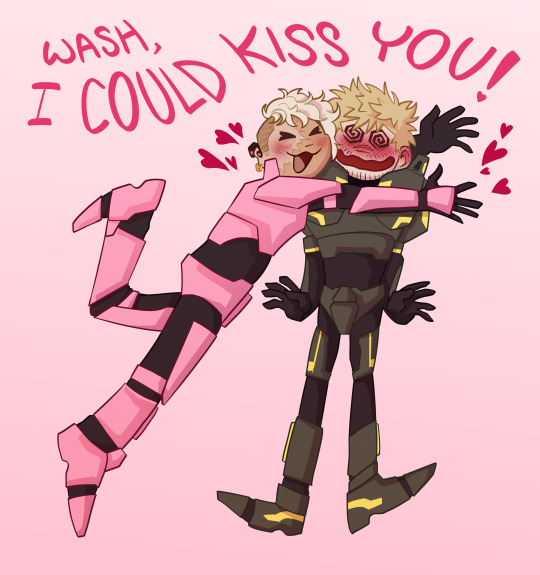
Fifth year of RvB Secret Santa! This one is for @asphodeldreams! if you give me the chance to draw Washnut I am going to take that chance at every available opportunity, and I've also never done an illustration with the famous quote so I just had to add it :3
@redvsbluesecretsanta
#rvb#red vs blue#agent washington#franklin delano donut#wash#donut#fanart#rvb secret santa#realized after finishing this that i've drawn donut 4 years out of 5 lol. my bias for the dumb cotton swab <3#also as a little note asphodeldreams i recognized your username -#- but it didn't click until i went on your blog and went OHHH. you're also a phannie#so hiiii i recognized you from that haha
221 notes
·
View notes
Text
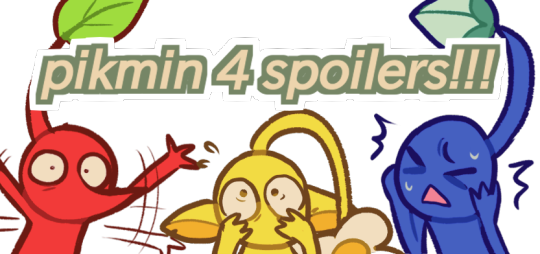

VERY major pikmin 4 spoilers under cut !!!

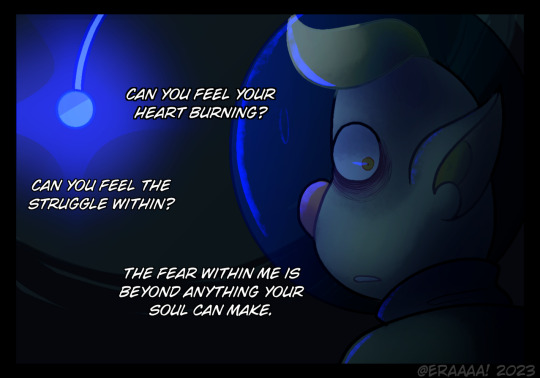
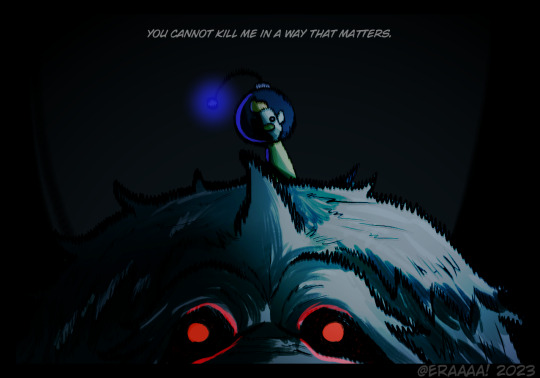
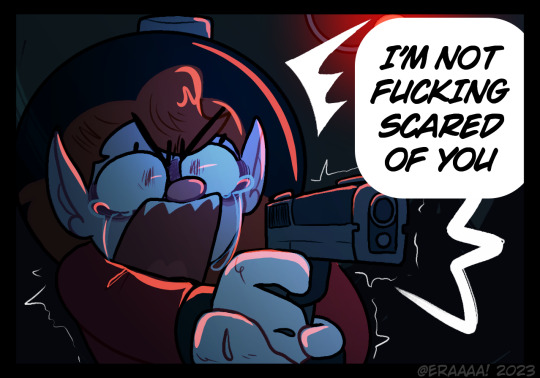
scary…
#pikmin#pikmin 4#pikmin spoilers#pikmin 4 spoilers#era.png#SPOILERS IN TAGS ALSO !!!#gun tw#tw gun#try not to read these if u havent finished the game yet ……….#ok here we go#pikmin 4 captain#lisa pikmin#pom pikmin#ancient sirehound#louie pikmin#pikmin louie#id in alt text#more than 5 notes! impressive
2K notes
·
View notes
Note
can you tell me the timeline of twisted wonderland I know the game timeline started in September or august now the timeline is january or febary

The timeline for the main story is as follows:
Prologue - Based on book 1’s timing, probably very late August or very early September.
Book 1 - Crewel states that start of the school year is in September; other students like Cater drop hints that the new students are still getting acclimated to the routine of school. The light novel is even more specific; the OB fight is stated to happen within the first week of school.
Book 2 - Crowley states that the interdorm spelldrive/magift tournament takes place in October.
Book 3 - Final exams of the fall semester are mentioned, so this is before winter break. Most likely occurs in November.
Book 4 - Begins on the last day of the fall semester and continues through winter break (late December) and into the new year (January). This is pretty explicitly stated in various characters’ dialogue (Jamil, Crowley, Ramshackle Ghosts, Lilia, Octavinelle, etc.) or by in-game omnipotent narration.
Book 5 - Begins in the new year (January) and factoring in ~1 months’ worth of training, we end book 5 in mid-February, when VDC/SDC takes place. Mid-February is explicitly mentioned by Crewel.
Book 6 - Takes place literally a few days after book 5, so presumably still in February. Idia states that 5 Overblots (not counting himself) occurred in less than 6 months.
Book 7 - Estimated to be in March due to a variety of factors. It must be spring because Yuu is surprised to see (Malleus’s magically produced) snow when wandering outside of Ramshackle + says “I thought it’s supposed to be spring.” The interscholastic spelldrive/magift tournament takes place in May, but presumably has not occurred yet + Silver states his birthday (May 15) is still “a little ways away”. Assuming NRC has a spring break in April or mid/late March, it must not have happened yet because 1) no students mention a break and 2) the third years would need to apply for their internships early in the semester to allow time for their paperwork to be processed and to do additional tests and interviews. Lilia does say at his farewell party that a full 6 months have passed since the start of the school year; he would have said 7 if it was April. UPDATE: book 7 ends on Silver's birthday, May 15.
I have added this information (or at least a link to it) in my pinned post, which already contains a FAQ section. I highly recommend to my readers to look at the FAQ first before sending in their question(s), as there is a good chance that your question may have already been answered there. Any questions that are repeats of the ones shown in the FAQ will go ignored/unanswered moving forward.
#twisted wonderland#twst#disney twisted wonderland#disney twst#book 1 spoilers#prologue spoilers#book 2 spoilers#book 3 spoilers#bool 4 spoilers#book 5 spoilers#book 6 spoilers#book 7 spoilers#notes from the writing raven#question#advice#twst resource#twisted wonderland resource#twst light novel#twisted wonderland light novel
457 notes
·
View notes
Text
🎄💋Merry Kiss💋🎄
Pairing: Various Aged Up Adult Characters x Adult!GN!Reader
CW: Basic holiday content with implied lovemaking at the end.
Happy Holidays!

Oh the holidays. The snow be falling. The lights be glowing. The discount bargain sales. Reds greens and yellows are the color scheme of this month. You couldn't be immune to the cheery merry sensations. In your cozy decorated home on Christmas Eve, your significant other keeps an arm draped around you or holding your hand tenderly the whole night. Whether it be curling up together lost in your own starry eyed world or cuddling and immersing in your shared warmth. Through the hearty feast, the eggnog and cider, even the Christmas movie marathon, sharing this time of year with them swelled up your heart. To their surprise, mistletoe lined the ceiling all over. To their delight, you showered them in tender, burning passionate smooches. One thing leads to another, clothing falling and decorating the floor, as your bare bodies grew entangled in the thralls of passion before the crackling fireplace. As the clock tolls midnight, you both came with creamy thick pleasure. Bidding each other a Merry Christmas before savoring another few rounds of merry making throughout the powdery twinkling night. Awakening to the sunrise of Christmas Day, to where more kisses and smashes became your gift to one another. What a way to spend the holidays.
#jujutsu kaisen x reader#hypnosis mic x reader#code geass x reader#death note x reader#blue exorcist x reader#black butler x reader#demon slayer x reader#solo leveling x reader#my hero academia x reader#persona 3 x reader#persona 4 x reader#persona 5 x reader#yugioh x reader#bungou stray dogs x reader#blue lock x reader#wind breaker x reader#tokyo revengers x reader#twisted wonderland x reader#sk8 the infinity x reader#free! x reader#obey me x reader#danganronpa x reader#trigun stampede x reader#chainsaw man x reader#zenless zone zero x reader#various x reader#anime x reader#anime au#implied smut#christmas
168 notes
·
View notes